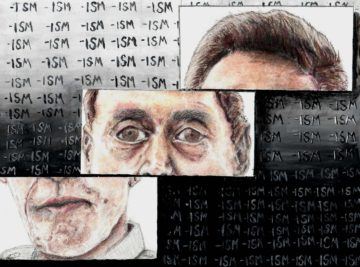Micah Rosen in Taxis:
 It was February 20, 1939, two days before George Washington’s birthday. Fritz Kuhn, leader of the prominent pro-Nazi German American Bund, took the stage at Madison Square Garden. Behind him stood a towering 30-foot portrait of the first US president between giant swastikas, and around him twenty thousand rally-goers. Posters at this infamous Pro-America Rally promised a “mass-demonstration for true Americanism,” bringing National Socialist ideals to the American people. Participants waved American flags, marched to loud drum rolls, and heard pro-fascist speeches. Speakers urged the audience to embrace National Socialism, not merely to show support for Germany, but above all because it was fundamentally American.
It was February 20, 1939, two days before George Washington’s birthday. Fritz Kuhn, leader of the prominent pro-Nazi German American Bund, took the stage at Madison Square Garden. Behind him stood a towering 30-foot portrait of the first US president between giant swastikas, and around him twenty thousand rally-goers. Posters at this infamous Pro-America Rally promised a “mass-demonstration for true Americanism,” bringing National Socialist ideals to the American people. Participants waved American flags, marched to loud drum rolls, and heard pro-fascist speeches. Speakers urged the audience to embrace National Socialism, not merely to show support for Germany, but above all because it was fundamentally American.
The event met with widespread condemnation. New York Mayor Fiorello La Guardia called it an “exhibition of international cooties.” Others were critical, but did not see great cause for alarm. Shortly after the event an editorial in the New York Times expressed confidence that the rally-goers were no more than a harmless fringe group. “The Bund, functioning freely, is its own best argument against itself,” read the piece. “We are not, to state the case mildly, afraid of the Bund. The limits to which this or any group… may go are definite.”
But to one young man by the name of Peter Viereck, there was more cause for concern. A twenty-two-year-old poet and student of history at the time, Viereck feared the implications of rallies like this — both for his family and his country. Just five years earlier, when he was in college, his German-American father, George Sylvester Viereck, had stood on the same stage and proclaimed his support for Hitler to a crowd of tens of thousands of Nazi sympathizers.
More here.
